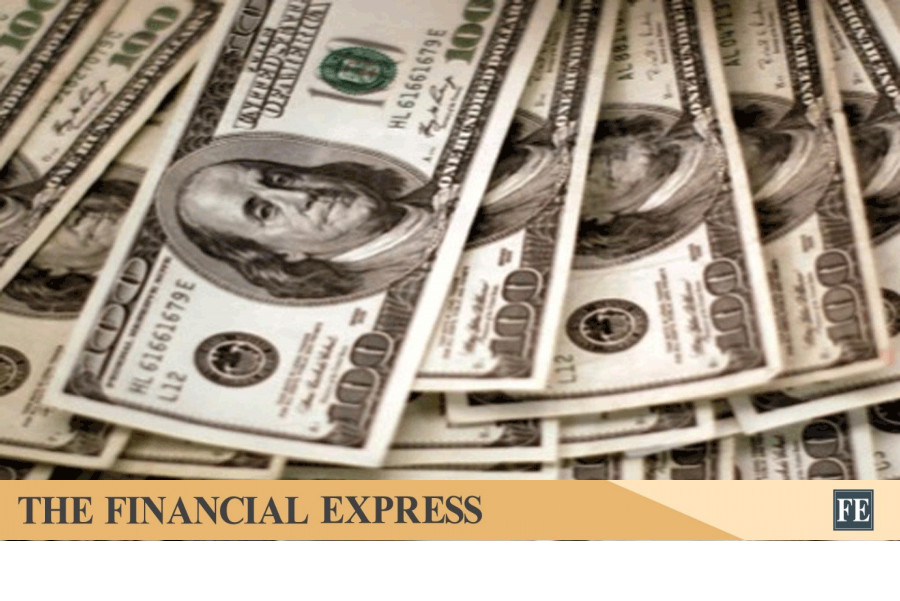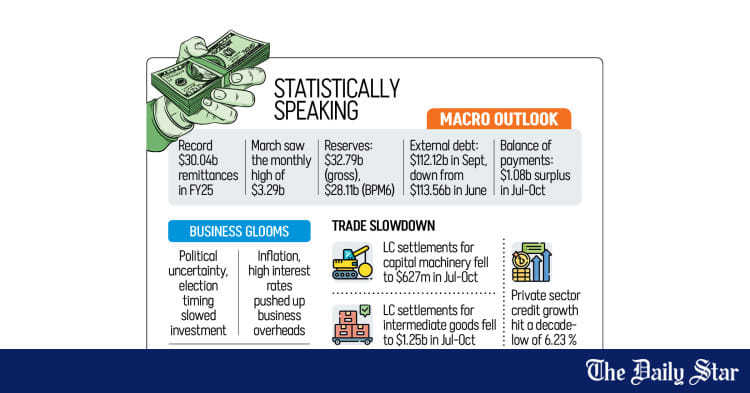Saif
Senior Member
- Joined
- Jan 24, 2024
- Messages
- 16,158
- Likes
- 8,062
- Nation

- Axis Group


Remittances hit $2.93 billion in 28 days of December
The upward trend in remittances sent by expatriate Bangladeshis has continued in December, with receiving over US $ 2.93 billion in 28 days of the month. Bangladesh received $15.97 billion inward remittance so far in the current fiscal year FY 2025-26. According to the latest update from Banglade
Remittances hit $2.93 billion in 28 days of December
UNB
Published :
Dec 30, 2025 00:03
Updated :
Dec 30, 2025 00:11

The upward trend in remittances sent by expatriate Bangladeshis has continued in December, with receiving over US $ 2.93 billion in 28 days of the month.
Bangladesh received $15.97 billion inward remittance so far in the current fiscal year FY 2025-26.
According to the latest update from Bangladesh Bank, the $ 2.93 billion remittance in 28 days of December, is an increase by 21.3 percent compared to the same period last year. In December of the previous year (2024), the country received around $ 2.42 billion in 28 days of December.
The growth is attributed to several factors, including incentives offered for sending money through legal banking channels, increased encouragement for using the formal system, and the active role of exchange houses.
Remittance inflow has shown robust growth throughout the current fiscal year (FY 2025-26). From July 1 to December 28, 2025, the total remittance inflow reached $15.97 billion. This represents an increase of $2.42 billion compared to the same period in the previous fiscal year (FY 2024-25), when the total stood at $ 13.55 billion. The year-on-year growth rate for the fiscal year to date is 17.8 percent.
Following a significant jump in inward remittances this year, Bangladesh Bank has been actively purchasing dollars from commercial banks to maintain market stability and balance the supply-demand of foreign exchange.
Bangladesh Bank Executive Director and Spokesperson Arif Hossain Khan said that the central bank purchased $ 3.05 billion in the current fiscal year. As a result, the gross forex reserves crossed $32 billion so far.
As commercial banks face a surplus of dollars due to the remittance boom, the central bank has stepped in to prevent drastic fluctuations in the exchange rate.
UNB
Published :
Dec 30, 2025 00:03
Updated :
Dec 30, 2025 00:11
The upward trend in remittances sent by expatriate Bangladeshis has continued in December, with receiving over US $ 2.93 billion in 28 days of the month.
Bangladesh received $15.97 billion inward remittance so far in the current fiscal year FY 2025-26.
According to the latest update from Bangladesh Bank, the $ 2.93 billion remittance in 28 days of December, is an increase by 21.3 percent compared to the same period last year. In December of the previous year (2024), the country received around $ 2.42 billion in 28 days of December.
The growth is attributed to several factors, including incentives offered for sending money through legal banking channels, increased encouragement for using the formal system, and the active role of exchange houses.
Remittance inflow has shown robust growth throughout the current fiscal year (FY 2025-26). From July 1 to December 28, 2025, the total remittance inflow reached $15.97 billion. This represents an increase of $2.42 billion compared to the same period in the previous fiscal year (FY 2024-25), when the total stood at $ 13.55 billion. The year-on-year growth rate for the fiscal year to date is 17.8 percent.
Following a significant jump in inward remittances this year, Bangladesh Bank has been actively purchasing dollars from commercial banks to maintain market stability and balance the supply-demand of foreign exchange.
Bangladesh Bank Executive Director and Spokesperson Arif Hossain Khan said that the central bank purchased $ 3.05 billion in the current fiscal year. As a result, the gross forex reserves crossed $32 billion so far.
As commercial banks face a surplus of dollars due to the remittance boom, the central bank has stepped in to prevent drastic fluctuations in the exchange rate.


































